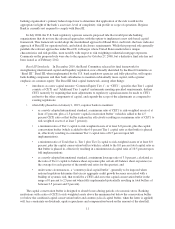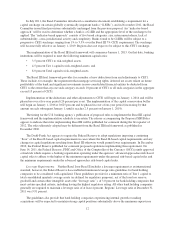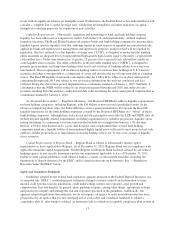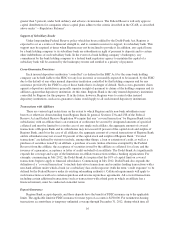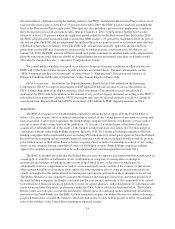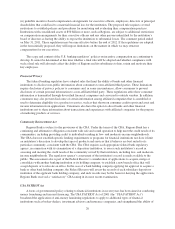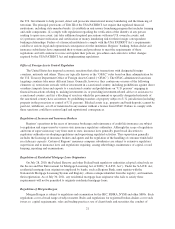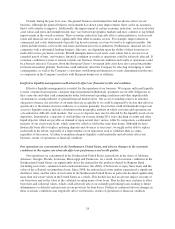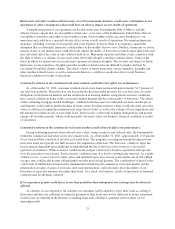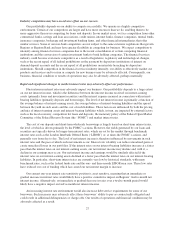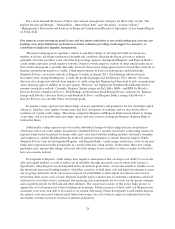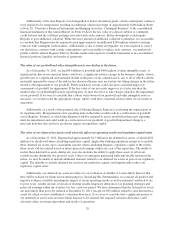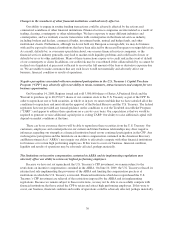Regions Bank 2011 Annual Report Download - page 45
Download and view the complete annual report
Please find page 45 of the 2011 Regions Bank annual report below. You can navigate through the pages in the report by either clicking on the pages listed below, or by using the keyword search tool below to find specific information within the annual report.the U.S. Government to help prevent, detect and prosecute international money laundering and the financing of
terrorism. The principal provisions of Title III of the USA PATRIOT Act require that regulated financial
institutions, including state member banks: (i) establish an anti-money laundering program that includes training
and audit components; (ii) comply with regulations regarding the verification of the identity of any person
seeking to open an account; (iii) take additional required precautions with non-U.S. owned accounts; and
(iv) perform certain verification and certification of money laundering risk for their foreign correspondent
banking relationships. Failure of a financial institution to comply with the USA PATRIOT Act’s requirements
could have serious legal and reputational consequences for the institution. Regions’ banking, broker-dealer and
insurance subsidiaries have augmented their systems and procedures to meet the requirements of these
regulations and will continue to revise and update their policies, procedures and controls to reflect changes
required by the USA PATRIOT Act and implementing regulations.
Office of Foreign Assets Control Regulation
The United States has imposed economic sanctions that affect transactions with designated foreign
countries, nationals and others. These are typically known as the “OFAC” rules based on their administration by
the U.S. Treasury Department Office of Foreign Assets Control (“OFAC”). The OFAC-administered sanctions
targeting countries take many different forms. Generally, however, they contain one or more of the following
elements: (i) restrictions on trade with or investment in a sanctioned country, including prohibitions against direct
or indirect imports from and exports to a sanctioned country and prohibitions on “U.S. persons” engaging in
financial transactions relating to, making investments in, or providing investment-related advice or assistance to,
a sanctioned country; and (ii) a blocking of assets in which the government or specially designated nationals of
the sanctioned country have an interest, by prohibiting transfers of property subject to U.S. jurisdiction (including
property in the possession or control of U.S. persons). Blocked assets (e.g., property and bank deposits) cannot be
paid out, withdrawn, set off or transferred in any manner without a license from OFAC. Failure to comply with
these sanctions could have serious legal and reputational consequences.
Regulation of Insurers and Insurance Brokers
Regions’ operations in the areas of insurance brokerage and reinsurance of credit life insurance are subject
to regulation and supervision by various state insurance regulatory authorities. Although the scope of regulation
and form of supervision may vary from state to state, insurance laws generally grant broad discretion to
regulatory authorities in adopting regulations and supervising regulated activities. This supervision generally
includes the licensing of insurance brokers and agents and the regulation of the handling of customer funds held
in a fiduciary capacity. Certain of Regions’ insurance company subsidiaries are subject to extensive regulatory
supervision and to insurance laws and regulations requiring, among other things, maintenance of capital, record
keeping, reporting and examinations.
Regulation of Residential Mortgage Loan Originators
On July 28, 2010, the Federal Reserve and other Federal bank regulatory authorities adopted a final rule on
the Secure and Fair Enforcement for Mortgage Licensing Act of 2008 (“S.A.F.E. Act”). Under the S.A.F.E. Act,
residential mortgage loan originators employed by banks, such as Regions Bank, must register with the
Nationwide Mortgage Licensing System and Registry, obtain a unique identifier from the registry, and maintain
their registration. As of July 30, 2011, any residential mortgage loan originator who fails to satisfy these
requirements will not be permitted to originate residential mortgage loans.
Regulation of Morgan Keegan
Morgan Keegan is subject to regulation and examination by the SEC, FINRA, NYSE and other SROs. Such
regulations cover a broad range of subject matter. Rules and regulations for registered broker-dealers cover such
issues as: capital requirements; sales and trading practices; use of client funds and securities; the conduct of
21


